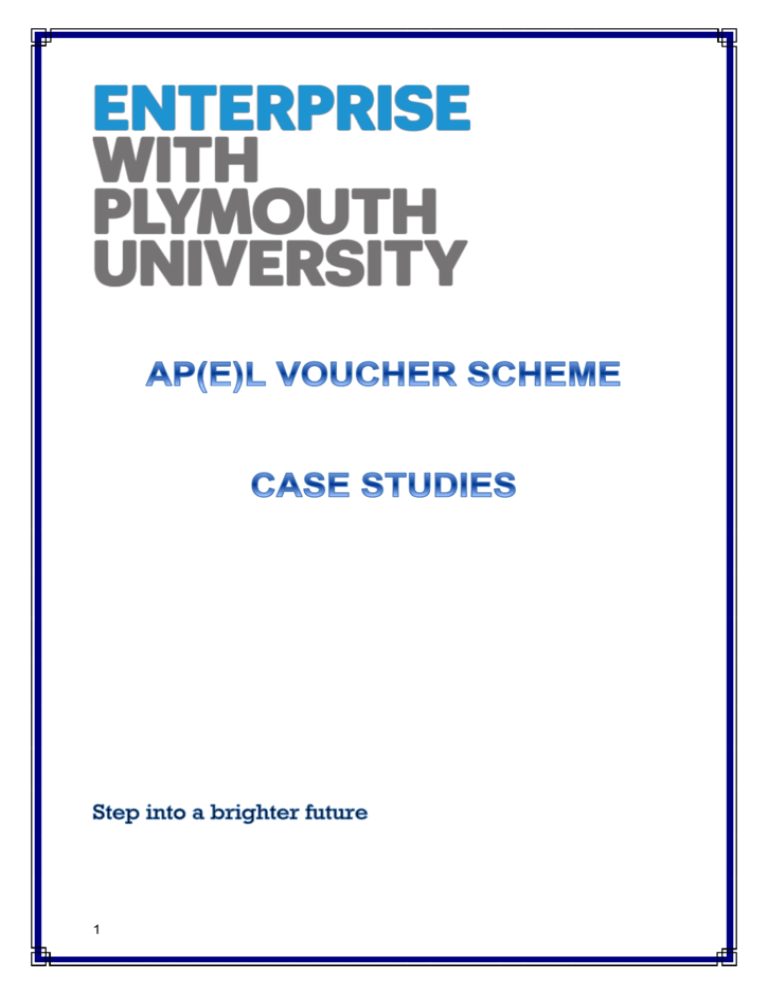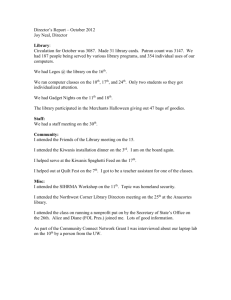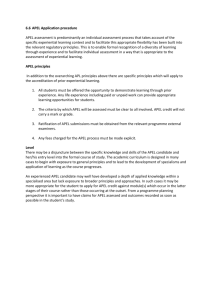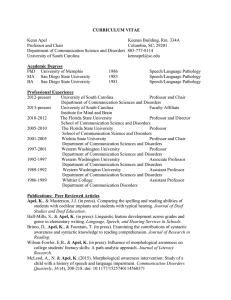
Plymouth
1
We recognise the value that a variety of informal learning events can have in
contributing to professional development. We have therefore developed a scheme
which enables participants to demonstrate its value through academic assessment
and use this to obtain academic credit within academic pathways.
The schemes work by providing a certain number of vouchers for different types of
education – workshops, conferences, study days –that can then be used as a
gateway to enrol within a module. Each informal learning activity will fit within a
theme, typically arranged around a professional or interest area, that is identified by
the voucher awarded.
Participants having completed a defined level of education will be able to enrol on
the module at a discounted price that reflects the fact that the education has already
taken place. Once enrolled the individual will agree with the academic team an
appropriate piece of academic work which assesses how the student has utilised this
combination of informal learning. The assessment may for example be used to
demonstrate how they have applied the knowledge or skills gained within their role,
or within a certain project or in other forms of professional and personal development.
The learning events can be held by professional bodies for example the Royal
College of Nursing (RCN), Resuscitation Council, Institute of Leadership and
Management (ILM) or held in the workplace by the local Trust in addition to the
conferences or workshops held in the University or Nationally.
For the events to be included in a claim these are agreed in advance with the
academic and professional service staff.
The case studies below are all from students who work in Health; however this can
be adapted for any student who has attended professional or work related study
days which enhance their role in business, education or any other field of study.
The following case studies have all been facilitated by the one academic. She has
met with all the students on several occasions in or near their workplace. These
students are a mix of Adult Nurses, Specialist Nurses, Mental Health Nurses,
Midwives, Paramedics and Occupational Therapists. These students are all
currently working in local NHS Trusts.
In its simplest form we are looking for emerging skill sets which enhance your
everyday role (day job).
Please be reassured that you will have an opportunity to discuss your needs when
you eventually meet with the named academic at a briefing session. She/he will
assist you with clarification around skills sets and will give you written guidance to
follow. You will have an opportunity to discuss and clarify your claim during this
session. It is after this the briefing session that you can decide if you wish to
proceed with your claim.
2
3
Role: Diabetes Clinical/Research Nurse
This student attended the following professional learning events within the last two
years. They are:
Assessment and treatment of erectile dysfunction in diabetes (2 days)
Assessment of arterial stiffness in patients with Alstron syndrome (1 day)
Use of Incretin Mimetics in the treatment of Type 2 diabetes (2 days)
This student considered each event as a skill acquisition in their own right. She
discussed in detail the changes made to her own practice. She has shared her
learning with others by providing education and support. She has promoted a range
of activities to enhance the patient experience. She related everything to
contemporary literature.
“An excellent process that enabled me to recognise and summarise my previous
learning. It helped me to identify future aspirations and learning needs. It was also
useful as part of my work appraisal”.
Role: Helicopter Emergency Medical Services (HEMS) Aircrew
Paramedic
This student attended the following professional learning events:
Advanced Paediatric Life Support course (2 days)
Pre Hospital Trauma Life Support course (2 days)
Paediatric Life Support Study Day (1 day)
She elected to analyse and explore the following skills from the above events:
Intraosseous access/infusion
Clinical algorithms
Patient handover
The learning events for this portfolio focussed on trauma and critically ill patients.
She used a case study to explore and discuss the issues. Her ideas to improve
practice have already been implemented within her Trust.
4
Role: Research Nurse
This student attended the following Trust learning events and chose to explore each
event in its own right and the skills associated with it.
Clinical Supervision
Centrifuge training
Use of dry ice
Informed consent
Good clinical practice training
The use of the NHS Knowledge and Skills Framework (core dimensions) to
summarise learning proved to be a useful tool. It demonstrates the student’s growth,
development, ability to reflect and self-evaluate and an ethos of lifelong learning.
“The APEL Voucher Scheme was extremely helpful to finish my degree. Would
recommend it to others”
This student attended the following Professional and Trust learning events:
Infection prevention and control (IPC) – “Tomorrow’s World”
IPC – “Here and Now”
IPC – Evolution of practice through Evidence
Excellence in practice documentation and record keeping
DP – Learning from Patient Experience ( a focus on communication)
The student chose to use the NHS Knowledge and Skills Framework as a template
for a whole portfolio (core dimensions). She also related each dimension to specific
learning outcomes. She was able to show how she put her learning into practice and
the effectiveness of reflection. This worked well for her.
5
Role: Perinatal Clinical Team Leader
This student attended the following Trust and Professional learning events:
Patient Mental Health Course
Safeguarding
Safeguarding and Peri-natal Mental Health Conference
Perinatal Mental Health Conference.
This student used two case studies and a conference presentation to identify and
evaluate the themes and skills that emerged which impacted on her practice. She
analysed studies and presentation and developed an action plan from each. She
constantly reviewed her own practice and validated her learning and expertise while
maintaining his as part of her on-going personal and professional development.
“An excellent way to consolidate on learning relevant to my role”.
Role: Diabetes Research Nurse
This student attended the following Trust and Professional learning events:
Introduction to Diabetes
Good Clinical Practice
Diabetes UK Professional Conference
Insulin Injection course
She chose to consider each learning event and the skills associated with each. She
did an individual reflection on each and discussed how she was developing her own
practice. She also used the NHS Knowledge and Skills Framework to summarise
her learning and in fact expanded on this by the addition of other relevant learning
for example around Disability.
“It was fantastic to be able to finish my degree by writing a portfolio summarising my
role, what I had learnt on my journey through education and how it helped me to
develop professionally. Many thanks for the support and guidance, looking forward
to the graduation great sense of achievement.”
6
Role: Midwife – Labour Ward coordinator
This student attended the following Trust learning events:
PROMPT – training the trainer
Maternity Clinical Risk Management
Child Protection foundation course
Obstetric ultrasound course
This student considered each learning event and the skills associated. All of these
events resulted in some measure of change in the student’s workplace. To do this
the student considered ‘Change Management’ as an important skill in itself.
“This was a useful way to gain more points it made the degree personal to me and
what I do. I wold advise candidates to think carefully about what sessions they
choose to consider for their portfolio assignment – make sure they have a common
theme “e.g. safety so that they can be linked. Writing something that flows is so
much more satisfying. The tutor time was very flexible and personal. This made all
the difference to feeling in control of the assignment”.
Role: Rheumatology Support Nurse
SW Rheumatology Nurses Meetings
‘A new force against fracture’
Introduction to good clinical practice
The long term outcome in Psoriatic Arthritis
New Rheumatology Nurse Specialist Study Day
This student used 5 core dimensions of the NHS Knowledge and Skills Framework
to demonstrate the learning and reflections from these events. Used a SWOT
analysis, and was very pro-active in achievements and developments from these
events.
“More affordable, as much work as an assignment but less research required.
Relevant to work and made me get more involved and consider study days in greater
detail and put the learning into practice”.
7
Role: Practice/Research Nurse
Advanced Nurse Respiratory Network Meeting
Diabetes UK Conferences
Spirometry Day
Inhaler Day
Telehealth Meeting
Knowledge and Skills Framework used to good effect. Summaries of achievements
from individual learning events included throughout which was impressive.
“The APEL Scheme enables the student to gain credits for and celebrate personal
achievements. There are no time restrictions on the length of time it takes for the
student to compile her portfolio, an advantage if any personal constraints are placed
upon the student”.
Role: Respiratory Nurse Specialist
This student attended the following events.
Managing breathlessness in palliative care
Interstitial Lung Disease for Nurses
British Thoracic Society
BTS Summer Meeting
From these she considered the following skills and related them all to her current
role. Assessment of breathlessness, helping patients cope with breathlessness.
Educating others about breathlessness. Clinic Nursing Management of Interstitial
lung disease.
“The APEL voucher scheme was very useful to help me finish my degree. I
appreciated that it acknowledged study and practice that I had already undertaken.
It also provided evidence for my annual PDR”
8
Role: Specialist Occupational Therapist (OT) working in Community
Rehabilitation (CR)
This student attended the following study events
Parkinson’s Awareness Course
E-Learning on Safeguarding Vulnerable Adults
Mental Capacity Act and Deprivation of Liberty Safeguards
College of Occupational Therapists Annual Conference
This student used the learning from these events and identified them in their
personal development review (PDR). They analysed the learning from each event
individually and showed how they applied the new knowledge to improve their
professional skills in practice, using case studies to demonstrate this.
“The APEL scheme has been an immensely useful contribution towards the
completion of my degree. It has enabled me to utilise real training and consider how
I’ve implemented this to the benefit of patients and my workplace. It has made my
degree practical, useful and relevant as well as contributing to continuing
professional development, so my degree is not an ‘add-on’ but applicable to my role”
Role: Practice Nurse in a Medical Centre and an Associate Lecturer.
This student attended the following events.
RCN Practice Nurse Conference
COPD Expert Forum
Almost everything you need to know about Vascular Disease
Pan-Peninsula Diabetes Masterclass
Diabetes UK Southwest Annual Conference.
The learning outcomes and events were linked to the five subsections of the portfolio
which described, explored and critically reflected on the student’s involvement in in
five practice based developments.
9
Setting up a nurse-led hypertension management clinic
An initiative to promote best practice for blood pressure measurement
10
Introducing cardiovascular risk assessment to the nurse-led hypertension
clinic
A screening event aimed at detection of early respiratory disease
The design of a patient-held record for patients with diabetes.
“The flexible and open approach of APEL is allowing me to complete my BSc (Hons)
Health Studies, this has been my goal for many years and at last it seems possible”.
“The APEL Voucher Scheme was extremely helpful to finish my degree. Would
recommend it to others”
“An excellent way to consolidate on learning relevant to my role”.
“This was a useful way to gain more points it made the degree personal to me and
what I do. I wold advise candidates to think carefully about what sessions they
choose to consider for their portfolio assignment – make sure they have a common
theme e.g. safety so that they can be linked. Writing something that flows is so
much more satisfying. The tutor time was very flexible and persona. This made all
the difference to feeling in control of the assignment”.
“More affordable, as much work as an assignment but less research required.
Relevant to work and made me get more involved and consider study days in greater
detail and put the learning into practice”.
“The APEL voucher scheme was very useful to help me finish my degree. I
appreciated that it acknowledged study and practice that I had already undertaken. It
also provided evidence for my annual PDR”
“An excellent process that enabled me to recognise and summarise my previous
learning. It helped me to identify future aspirations and learning needs. It was also
useful as part of my work appraisal”.
“The APEL scheme has been an immensely useful contribution towards the
completion of my degree. It has enabled me to utilise real training and consider how
I’ve implemented this to the benefit of patients and my workplace. It has made my
degree practical, useful and relevant as well as contributing to continuing
professional development, so my degree is not an ‘add-on’ but applicable to my role”
“The APEL scheme enables the student to gain credits for and celebrate personal
achievements. There are no time restrictions on the length of time it takes for the
student to complete her portfolio, an advantage if any personal constraints are
placed upon the student.”
© Copyright University of Plymouth 2012. All Rights Reserved. The content of these documents may not be copied, reproduced,
republished, posted, broadcast or transmitted in any way without obtaining written permission from the University of Plymouth.
11
Contact Details
Jane Campbell-Baigrie
AP(E)L Programme Administrator
Faculty of Health and Human Sciences and Society
Fourth Floor, Rolle Building
Plymouth PL4 8AA
T 01752 586951
F 01752 586970
E j.campbell-baigrie@plymouth.ac.uk
The University is committed to providing information in
accessible formats. If you require this publication in an
alternative format, please contact +44 (0)1752 585337
12












